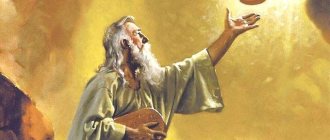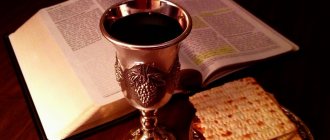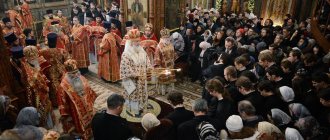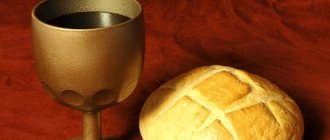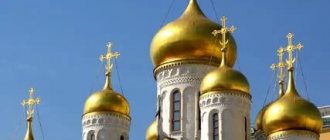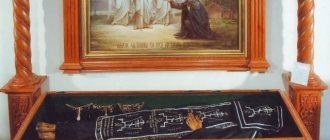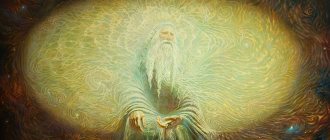The Mantle of the Prophet Elijah - the shrine of Georgian Mtskheta
Share
Svetitskhoveli
Georgia has two capitals. One modern one is Tbilisi. And next to Tbilisi there is a second and more ancient one - Mtskheta. There are a lot of ancient buildings here. Particularly noteworthy is the Svetitskhoveli Cathedral, where Georgian kings were once crowned, and today the Catholicos Patriarchs are installed. Great Christian shrines are also kept in Svetitskhoveli. One of the most valuable is the mantle of the prophet Elijah. The mantle is a cape made of sheep or goat skin. Such clothing is still popular among shepherds in the Middle East.
The Prophet Elijah lived nine centuries before the birth of Christ. He is one of the most revered and at the same time mysterious saints. The fact is that Elijah did not die, but was taken alive into heaven - caught up in a fiery chariot sent by God. Before his ascension, the prophet gave the mantle to his disciple and successor Elisha. Elijah's cloak was first in his possession, and after Elisha's death it was preserved by the Jews in Palestine as a great shrine. After all, people were healed from illnesses by touching the miloti.
How did this shrine leave the Middle East and end up in Georgia? The answer is simple - as a result of wars. The Kingdom of Israel was repeatedly attacked by the Egyptians, Babylonians, Greeks, and Romans. As a result, the chosen people found themselves scattered across the face of the earth. Thus, a large Jewish diaspora formed even before the birth of Christ on the territory of modern Georgia. By the will of God, it was these immigrants who ended up with the mantle of the prophet Elijah. Subsequently, it became one of the most significant relics of the Georgian Church. According to local tradition, it was safely hidden - placed in the foundation of the cathedral.
Georgia in the past was often subjected to raids by conquerors. Therefore, there was a great danger of destruction of shrines. Once you enter the Svetitskhoveli Cathedral, you can easily find the place where Elijah’s mantle was buried. To the right of the main altar there is a small altar surrounded by a stone parapet. On the parapet there are images - episodes from the life of the prophet Elijah. Scientists have repeatedly wanted to open the floor of Svetitskhoveli and find out whether the prophet’s cape is really in the designated place. As Mtskheta guides say, Patriarch-Catholicos Elijah did not give his blessing to carry out the research, stating the following. If a person has faith that Elijah’s mantle is kept in Svetitskhoveli, then he does not need any additional evidence. If a person does not have such faith, then even scientific evidence will not help him. The guides usually end their stories with these words: “The fact that for centuries the Georgian people had no doubt about the whereabouts of Elijah’s mantle is the best proof that it is really kept in Svetitskhoveli.”
What is mantle, or Let's hit the waves with mercy?..
Is it possible to hit the waves with mercy?
...Years ago, in the regional newspaper on August 2 - on Elijah's Day - they published a note about the Old Testament prophet Elijah (this is the same prophet Elijah who ascended to heaven in a chariot of fire on horses of fire in a whirlwind) and appropriately quoted the Bible: “...And Elijah took his mercy [must be - mantle - V.S.], and rolled it up, and struck the water with it [Jordan - V.S.], and it parted back and forth, and they both crossed [with Elisha from Gilgal - B .S.] on dry ground” (
Fourth Book of Kings 2:8
).
“Milot” - translated from Church Slavonic (Old Russian) - “casing; sheepskin; sheepskin; clothing made from sheep's skins."
Four people - the author of the note, two proofreaders (in the editorial office and in the printing house) and the production editor - philologists by training! — they didn’t know such a word and decided to slightly correct the Bible, replacing “mercy” with “mercy.” No one noticed the “Ochepyatka”, not even the local priest. To the nonsense and nonsense - strike the waves with mercy! - no one paid attention either, - you never know what they’ll write in the newspaper!..
I call the editor and explain to her the essence of the matter. At first she was terribly alarmed: who authorized me, what organization am I from (!). I calmed her down and said that I was just a reader. She asks me: what should I do? I say print a correction in the next issue. The editor agreed and thanked me heartily, but no correction was ever published. That's where it all ended...
...But philologists study (or pass? - in the sense - pass by...) the Old Russian language at institutes and universities...
Notes
1. August 2 (July 20, Old Style) - among the Orthodox, the feast of the Prophet Elijah (popularly called Elijah the Prophet or Elijah's Day). According to mythological ideas, Elijah the Prophet controlled thunder (Ilya the Prophet rides across the sky in a fiery chariot; Elijah holds thunderstorms).
2. Folk signs for Ilya’s day: - on Ilya it’s summer before lunch, autumn after lunch; - if it’s dry on Elijah’s day, then it will be dry for six weeks; if it rains on that day, it will be dry for six weeks; - they stop swimming in the river (before Ilya the man swims, and after Ilya he says goodbye to the river); - from Ilyin’s day there is a turn to autumn, although summer with its heat will still last a long time; — haymaking ends, harvest begins; - on Elijah’s day even the stone will vegetate; - before Ilya’s day the clouds move with the wind, and after Ilya’s day against the wind; - before Ilya’s day there is a pound of honey in the hay, after Ilya’s day there is a pound of manure; - on Elijah’s day they don’t throw haystacks, otherwise it will burn in a thunderstorm; — on Elijah’s day they don’t work in the fields; - Elijah will come and bring rot (rains); - before Ilya the priest will not beg for rain, after Ilya the woman will catch up with an apron; - before Ilyin’s day it dries under the bush, but after Ilyin’s day it doesn’t dry on the bush; - On Elijah’s Day, dogs and cats are not allowed into the hut.
3. By the way, Word offers the following corrections for the “wrong” word millet
:
mercy
,
grind
,
mercy
,
beg
...
Tags: language, literacy, errors
Seven Prophetic Features in the Character and Ministry of Elisha. Dmitry Leo
First feature
Elisha was always with Elijah and was his servant. Servant - Heb. gets in the way. People who served not under duress, but as devoted disciples. So, for example, Joshua was the servant of Moses, John Mark was the servant of Paul and Barnabas. Paul calls Tychicus his beloved brother and faithful servant. Elisha lived in Elijah's house, saw and heard everything he did, and he learned everything from him. It was a good time to borrow some secrets from the prophetic life, but still it is humiliating to be a servant to someone, it is absolutely all hard and dirty work around the house and outside. It was a time of real humility because he could find a wife, have children, take over his father's inheritance, buy a house and farm the land.
2 Kings 3:11 And Jehoshaphat said, Is there not a prophet of the Lord here, that we may inquire of the Lord by him? And one of the servants of the king of Israel answered and said, Here is Elisha the son of Shaphat, who brought water into the hands of Elijah.
Second feature
Elisha not only served Elijah for food and clothing, but he wanted to receive his anointing and therefore did not leave him (2:6). Moreover, he turned out to be a very good student and mastered supernatural abilities.
2 Kings 2:9-12 When they had crossed over, Elijah said to Elisha, “Ask what you can do before I am taken from you.” And Elisha said, Let the spirit that is in you be doubly upon me. And he said: You are asking something difficult. If you see how I will be taken from you, then it will be so for you, but if you do not see it, it will not be so. As they walked and talked along the way, suddenly a chariot of fire and horses of fire appeared and separated them both, and Elijah rushed into heaven in a whirlwind. Elisha looked and exclaimed: My father, my father, the chariot of Israel and his cavalry! And I didn’t see him again.
Elijah did not promise him that he would definitely give the anointing, but set the condition “if you see me taken from you.” It was not so simple, that’s why Elijah set such a condition. Elisha did not waste time during his years of ministry and learned to see the spiritual world. He was not the son of Elijah to count on the anointing, but still he received it and, moreover, in double because he was a good servant and disciple.
And he picked up Elijah's mantle that had fallen from him, and went back and stood on the bank of the Jordan; and he took the mantle of Elijah that had fallen from him, and struck the water with it, and said, Where is the Lord, the God of Elijah—He Himself? And he struck the water, and it parted this way and that, and Elisha crossed over. And the sons of the prophets who were in Jericho saw him from afar, and said: The spirit of Elijah rested upon Elisha. And they went to meet him and bowed down to the ground.
Third feature
Elisha practically responded to the needs and requests of the people. He actually used supernatural anointing for help and healing, despite the fact that this was not part of the ministry of the prophets of that time. Prophets were primarily the mouth of God, not the hands. At that time, only priests were involved in healing, especially when it came to leprosy, there were many nuances and requirements in this regard.
2 Kings 2:19-22 And the men of that city said to Elisha, Behold, the state of this city is good, as my lord seeth; but the water is bad and the land is barren. And he said, Give me a new cup and put salt in it. And they gave it to him. And he went out to the source of the water, and threw salt there, and said: Thus says the Lord: I have made this water healthy; there will be no more death or barrenness from it. And the water became healthy unto this day, according to the word of Elisha which he spake.
2 Kings 4:1-2 One of the wives of the sons of the prophets cried out to Elisha, “Your servant, my husband, is dead; and you know that your servant feared the Lord; Now the lender has come to take both my children as slaves for himself. And Elisha said to her, “What shall I do to you?” tell me what you have in your house?
2 Kings 5:3 And she said to her mistress: Oh, if only my master would visit the prophet who is in Samaria, he would take away his leprosy!
Fourth feature
Elisha was not partial, he did not look at ranks and did not try to please anyone. He was not interested in authority and “cool” connections. Answering the king this way, it was hard to count on good relations in the future. Moreover, the king could have given a decree to execute Elisha in the same place.
2 Kings 3:13-14 And Elisha said to the king of Israel, “What do I have to do with you?” go to the prophets of your father and the prophets of your mother. And the king of Israel said to him, “No, because the Lord has called these three kings here to deliver them into the hand of Moab.” And Elisha said, As the Lord of hosts liveth, before whom I stand! If I had not respected Jehoshaphat king of Judah, I would not have looked at you or seen you;
Fifth feature
Elisha was a very revered and respected prophet at that time. Many would be honored to host him in their home and feed him and give him gifts. This would already be a great honor and reward for anyone. Elisha not only enjoyed the benefits, but noticed and appreciated the good nature and sacrifice of a person and wanted to reward him with what he had. She had the material, and he had the spiritual, and one served the other.
2 Kings 4:8-13 One day Elisha came to Shunam. There one rich woman begged him [to her] to eat bread; and whenever he passed by, he always went there to eat bread. And she said to her husband: Behold, I know that the man of God who passes by us constantly is holy; Let's make a small upper room over the wall and put him there a bed, and a table, and a seat, and a lamp; and when he comes to us, let him come there. One day he came there, and went into the upper room, and lay down there, and said to Gehazi his servant, Call this Shunammite woman. And he called her, and she stood before him. And he said to him: tell her: “Behold, you take such care of us; what should you do.
Sixth feature
Elisha cares for his disciples. Logically, they should have found food and fed the teacher during the famine. Elisha shows excellent character and caring.
2 Kings 4:38 And Elisha returned to Gilgal. And there was a famine in the land, and the sons of the prophets sat before it. And he said to his servant: Set up a large pot and cook some stew for the sons of the prophets.
2 Kings 4:42 A man came from Baal-shalisha and brought the man of God the firstfruits of grain—twenty loaves of barley and raw grains in the husk. And Elisha said, Give it to the people, let them eat. And his servant said, “What will I give to a hundred men?” And he said: Give it to the people, let them eat, for this is what the Lord says: “They will be satisfied, and there will be some left.”
He could also freely let his students go when they decided to leave, moreover, he also helped them settle down. He knew what it cost him to anoint Elijah, and it was not the right decision, but Elisha was able to release them and bless them.
2 Kings 6:1 And the sons of the prophets said to Elisha, Behold, the place where we live with you is too small for us; Let us go to the Jordan and take from there each one one log and make ourselves a place to live there. He said: go. And one said: Do me a favor, go you and your servants. And he said: I will go. And he went with them, and they came to the Jordan and began to cut down the trees.
Seventh feature
Elisha was very wise regarding gifts and money. He did not accept the gifts for healing Naaman, because this was the work of God, and in general those gifts were originally intended for the king, not him. But Elisha did not reject the gift from the hands of Hazael and gave the prophetic word about which the king of Israel asked and even more. God provides for us, but Gehazi's greed and lies cost him leprosy and he did not receive the anointing from Elisha.
2 Kings 5:15-16 And he and all that accompanied him returned to the man of God, and came and stood before him, and said: Behold, I have learned that in all the earth there is no God except among Israel; therefore accept the gift from your servant. And he said: As the Lord lives, before whom I stand! I won't accept it. And he forced him to take it, but he did not agree.
2 Kings 8:8-9 And the king said to Hazael, Take the gift in your hand and go to meet the man of God, and ask the Lord through him, saying: Will I recover from this illness? And Hazael went to meet him, and took the gift in his hand and all the best in Damascus, as much as forty camels could carry, and came and stood before him, and said: Your son Benhadad, king of Syria, has sent me to you to ask: “I will get well.” am I from this disease?
Why did the holy prophet Elijah leave his mantle to his disciple Elisha?
What would I like to say on the day of remembrance of the holy prophet Elijah, especially taking into account today's realities and an attempt to devalue, perhaps, one of the main qualities of the Church - apostolic succession and its direct consequence - the priestly hierarchy.
The central idea of the article is that in the Church you cannot serve on your own. No one can dare to “take” the priestly rank and say: “I am a priest.” This is impossible. The hands of a successor and heir to the apostles and their Teacher, Christ, are needed. It is important to humble yourself, bow under these apostolic hands, calm yourself and bend your neck, kneeling before God, before His Throne, so that the heir of the apostles, the legitimate bishop of the canonical Church, may lay hands on you. And then this Sacrament occurs: through this “living” spiritual “electric network” of souls and hearts, the grace of God suddenly begins to flow abundantly, replenishing and giving everything, creating a priest of God out of a man. But not from myself, not by myself.
The Church is calling you. God calls you to tend His sheep.
And this is remarkably evident from the life of the holy prophet Elijah (see the Third Book of Kings, chapter 19, vv. 11-21 and the Fourth Book of Kings, chapter 2).
These chapters tell the story of the Lord’s call to prophetic service through the holy prophet Elijah - Elisha.
It was not Elisha himself who entered the prophetic ministry. But the Lord pointed Elijah to him. Elijah covered Elisha with his mantle (outer clothing, usually made of sheepskin) and thereby chose him to serve. Elisha was worthy of this service. We are convinced of this from the fact that to celebrate, he slaughters oxen and makes a sacrificial fire from a plow in order to bring a thanksgiving sacrifice to God and show mercy to people (he then distributes the meat). That is, it is clear that he is a God-fearing person who loves God and people. Let’s imagine for a second what a plow and a pair of oxen meant to a Jewish peasant of that time? This is a fortune. But he sacrifices it to God.
When the holy prophet Elijah prepares to ascend to Heaven, he tells the prophet Elisha to ask for what he wants for himself. Elisha doesn’t care about material goods at all; he asks only for the grace of God and prophetic ministry. And he gets it. Moreover, materially, just as the bishop, after performing the Sacrament of the Priesthood, dresses the priest in priestly vestments, so after the ascension of Saint Elijah, the prophet Elisha receives his mantle, with which both prophets - the teacher (Elijah) and the disciple (Elisha) - work miracles.
Thus, the Lord calls the holy prophet Elisha through the holy prophet Elijah to the service of God - to the work of God.
Just as earlier the Lord commanded the holy prophet Moses to separate Aaron and his sons from among the people for priestly service. Just as thousands of years later, our Lord Jesus Christ elects the first apostles, and they ordain the first clergy. And thus the current of the grace of the Holy Spirit continues to flow. The circuit does not open.
And Baal remains Baal, no matter how much you strike three stones or strike a match, the fire does not go away. Because an idol has no grace. This is just some kind of human fantasy in alliance with the devil and demons.
God has already made a dwelling place for Himself. This is the One Holy Catholic and Apostolic Church. He made a dwelling for Himself and settled in it... in the holy prophet Elijah, in the holy prophet Elisha and in all of us - Orthodox Christians. What else should we look for? Elijah's jealousy. Jealousy over Bose. The name Elijah in Hebrew means “My Lord Yahweh (the Jehovah).” This was the meaning of the prophet's life. This should become the meaning of life for each of us: confession of the Living God, life in Him and every second approaching Him, uniting with Him.
The chariots of Israel and their cavalry lifted up the prophet Elijah. But we are this New Testament Israel and this is our cavalry, and the Lord has prepared for each of us, like the prophet Elijah, a place in heaven next to himself after the Ascension of the Lord. You just need to start this path of faith - the path to a living and loving God, who created the Church for our salvation.
Priest Andrey Chizhenko
Orthodox life
Orthodox Life
What would I like to say on the day of remembrance of the holy prophet Elijah, especially taking into account today's realities and an attempt to devalue, perhaps, one of the main qualities of the Church - apostolic succession and its direct consequence - the priestly hierarchy.
The central idea of the article is that in the Church you cannot serve on your own. No one can dare to “take” the priestly rank and say: “I am a priest.” This is impossible. The hands of a successor and heir to the apostles and their Teacher, Christ, are needed. It is important to humble yourself, bow under these apostolic hands, calm yourself and bend your neck, kneeling before God, before His Throne, so that the heir of the apostles, the legitimate bishop of the canonical Church, may lay hands on you. And then this Sacrament occurs: through this “living” spiritual “electric network” of souls and hearts, the grace of God suddenly begins to flow abundantly, replenishing and giving everything, creating a priest of God out of a man. But not from myself, not by myself.
The Church is calling you. God calls you to tend His sheep.
And this is remarkably evident from the life of the holy prophet Elijah (see the Third Book of Kings, chapter 19, vv. 11-21 and the Fourth Book of Kings, chapter 2).
These chapters tell the story of the Lord’s call to prophetic service through the holy prophet Elijah - Elisha.
It was not Elisha himself who entered the prophetic ministry. But the Lord pointed Elijah to him. Elijah covered Elisha with his mantle (outer clothing, usually made of sheepskin) and thereby chose him to serve. Elisha was worthy of this service. We are convinced of this from the fact that to celebrate, he slaughters oxen and makes a sacrificial fire from a plow in order to bring a thanksgiving sacrifice to God and show mercy to people (he then distributes the meat). That is, it is clear that he is a God-fearing person who loves God and people. Let’s imagine for a second what a plow and a pair of oxen meant to a Jewish peasant of that time? This is a fortune. But he sacrifices it to God.
When the holy prophet Elijah prepares to ascend to Heaven, he tells the prophet Elisha to ask for what he wants for himself. Elisha doesn’t care about material goods at all; he asks only for the grace of God and prophetic ministry. And he gets it. Moreover, materially, just as the bishop, after performing the Sacrament of the Priesthood, dresses the priest in priestly vestments, so after the ascension of Saint Elijah, the prophet Elisha receives his mantle, with which both prophets - the teacher (Elijah) and the disciple (Elisha) - work miracles.
Thus, the Lord calls the holy prophet Elisha through the holy prophet Elijah to the service of God - to the work of God.
Just as earlier the Lord commanded the holy prophet Moses to separate Aaron and his sons from among the people for priestly service. Just as thousands of years later, our Lord Jesus Christ elects the first apostles, and they ordain the first clergy. And thus the current of the grace of the Holy Spirit continues to flow. The circuit does not open.
And Baal remains Baal, no matter how much you strike three stones or strike a match - the fire does not go away. Because an idol has no grace. This is just some kind of human fantasy in alliance with the devil and demons.
God has already made a dwelling place for Himself. This is the One Holy Catholic and Apostolic Church. He made a dwelling for Himself and settled in it... in the holy prophet Elijah, in the holy prophet Elisha and in all of us - Orthodox Christians. What else should we look for? Elijah's jealousy. Jealousy over Bose. The name Elijah in Hebrew means “My Lord Yahweh (the Jehovah).” This was the meaning of the prophet's life. This should become the meaning of life for each of us: confession of the Living God, life in Him and every second approaching Him, uniting with Him.
The chariots of Israel and their cavalry lifted up the prophet Elijah. But we are this New Testament Israel and this is our cavalry, and the Lord has prepared for each of us, like the prophet Elijah, a place in heaven next to himself after the Ascension of the Lord. You just need to start this path of faith - the path to a living and loving God, who created the Church for our salvation.
Priest Andrey Chizhenko



